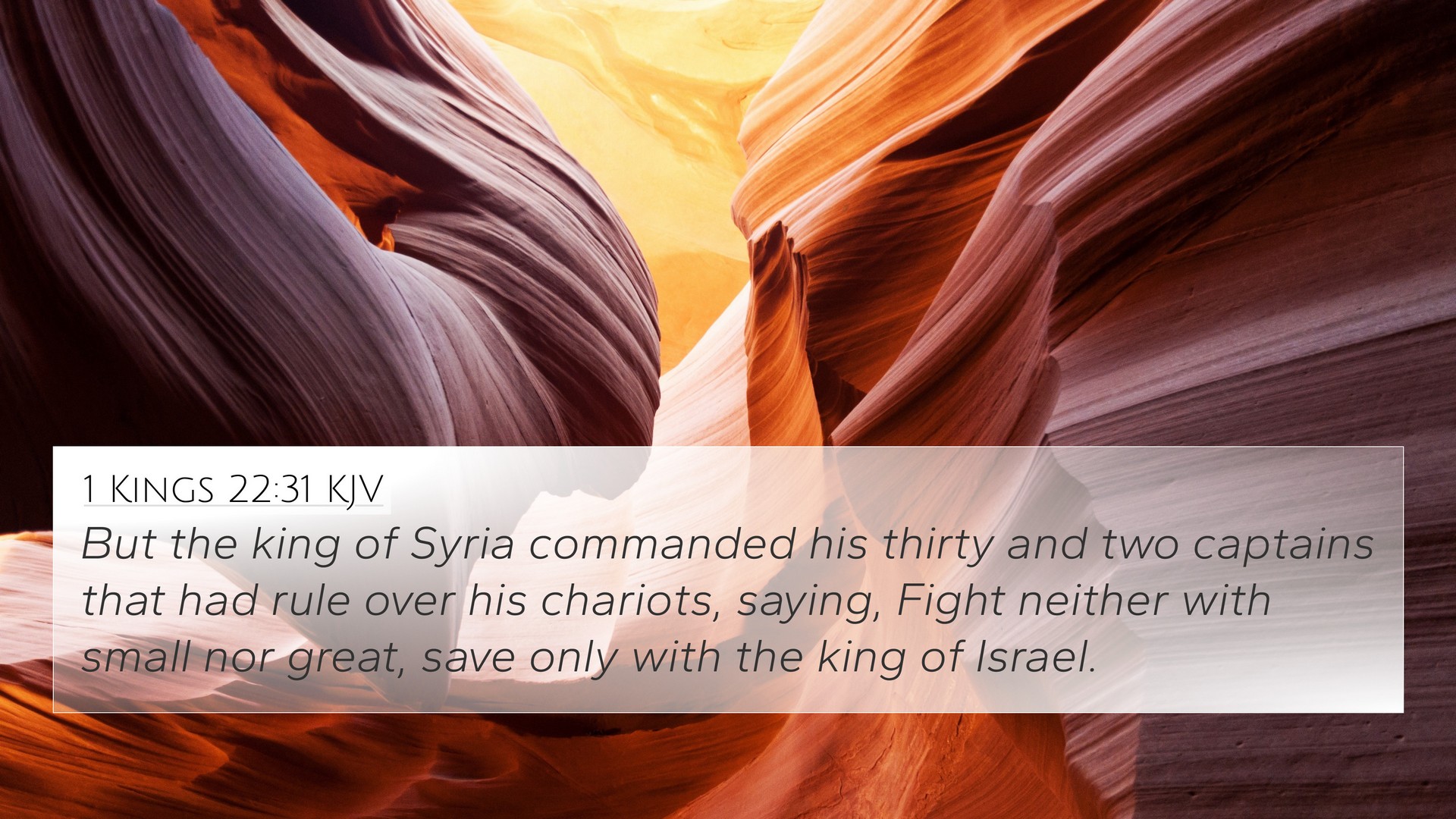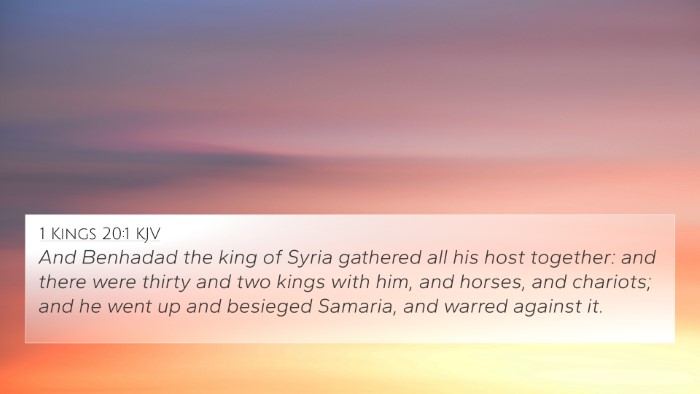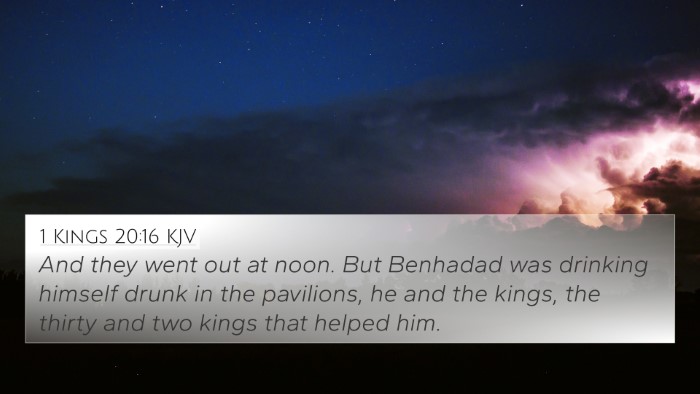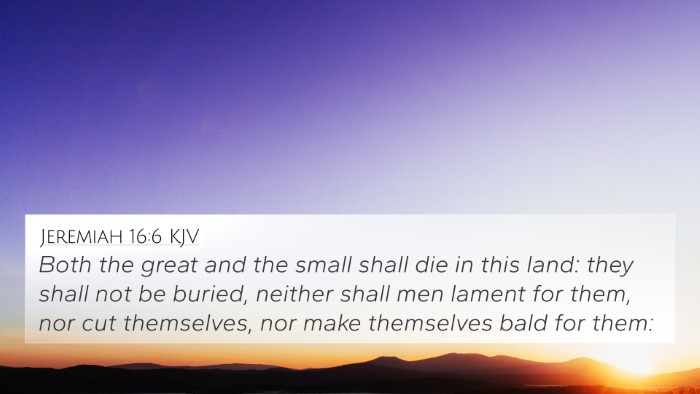Understanding 1 Kings 22:31
Verse: "But the king of Israel said to Jehoshaphat, 'There is still one man by whom we may inquire of the Lord, but I hate him, for he never prophesies good concerning me, but always evil. He is Micaiah the son of Imlah.' And Jehoshaphat said, 'Let not the king say so.'" (1 Kings 22:31)
Summary of Interpretation
This verse highlights the complex relationship between King Ahab of Israel and the prophet Micaiah. Ahab expresses a disdainful attitude towards Micaiah because he consistently delivers unfavorable prophecies about Ahab, which stem from Ahab's sinful actions and disregard for God's will. In contrast, King Jehoshaphat seeks godly counsel and desires to hear from the Lord, indicating a contrast in their approaches to divine guidance.
Thematic Insights
The verse delves into several themes that resonate throughout the Scriptures:
- Prophecy and Accountability: Ahab reflects a common human tendency to reject words that challenge personal desires or sinful behavior.
- Divine Justice: The refusal to heed prophetic warning serves as a reminder of God’s justice and the consequences of turning away from Him.
- Leadership and Integrity: Contrasts between Ahab and Jehoshaphat illustrate the impact of a leader’s character on their kingdom.
Cross-Referencing Biblical Texts
1 Kings 22:31 connects with various biblical themes and narratives. Below are some key cross-references:
- 1 Kings 22:8: Highlights Ahab's disdain for true prophets.
- 2 Chronicles 18:7: Further elaborates Ahab's negative feelings towards Micaiah.
- Jeremiah 28:10-11: Discusses the opposition between true and false prophets.
- Micah 7:3: Reflects on the prevalence of evil in leadership.
- Proverbs 12:15: Warns against those who disregard wise counsel.
- 2 Timothy 4:3: Speaks to the issue of people choosing teachers who tell them what they want to hear.
- Isaiah 30:10: Addresses the dislike for prophets who speak truthfully.
Insights from Public Domain Commentaries
Matthew Henry’s Commentary
Matthew Henry emphasizes Ahab's hatred for Micaiah as a reflection of a heart hardened against the truth. He points out that Ahab's adverse feelings stem from the prophet's consistent messages of judgment rather than blessing. Henry notes that a true prophet often suffers at the hands of those whose hearts are turned away from God.
Albert Barnes’ Notes on the Bible
Albert Barnes likens the situation to a common human trait—rejecting those who speak uncomfortable truths. He describes Ahab’s reluctance to approach Micaiah as rooted in fear and resentment. Barnes highlights that Jehoshaphat's invitation for Micaiah to speak indicates a desire for insight that aligns with God's truth, contrasting his wisdom against Ahab's folly.
Adam Clarke’s Commentary
Adam Clarke provides insight into the historical context of the interactions between Ahab and Micaiah. Clarke reflects on the moral implications of Ahab's disdain, illustrating the conflict between righteousness and unrighteousness. He emphasizes the importance of discernment in seeking counsel and urges readers to seek godly guidance even when it is difficult to accept.
Application to Today
This verse invites personal reflection on how individuals respond to difficult truths. It challenges readers to consider their attitudes towards godly counsel and the messengers of God. Are they like Ahab, who dismisses those who speak what he dislikes, or like Jehoshaphat, who acknowledges the need for divine wisdom?
Exploring Connections Between Bible Verses
In further comparative Bible verse analysis, the connections between 1 Kings 22:31 and other scriptures unveil key insights into God’s nature, the role of prophets, and the consequences of leadership choices. The thematic Bible verse connections enrich our understanding of the broader biblical narrative regarding prophecy, obedience, and the importance of truth in fostering a faithful community.
Conclusion
1 Kings 22:31 serves as a compelling reminder of the complexities of spiritual leadership, the importance of heeding God's messages, and the vital role of accountability within the faith community. As believers navigate their spiritual journeys, the lessons and warnings encapsulated in this verse encourage a commitment to aligning with divine wisdom.










